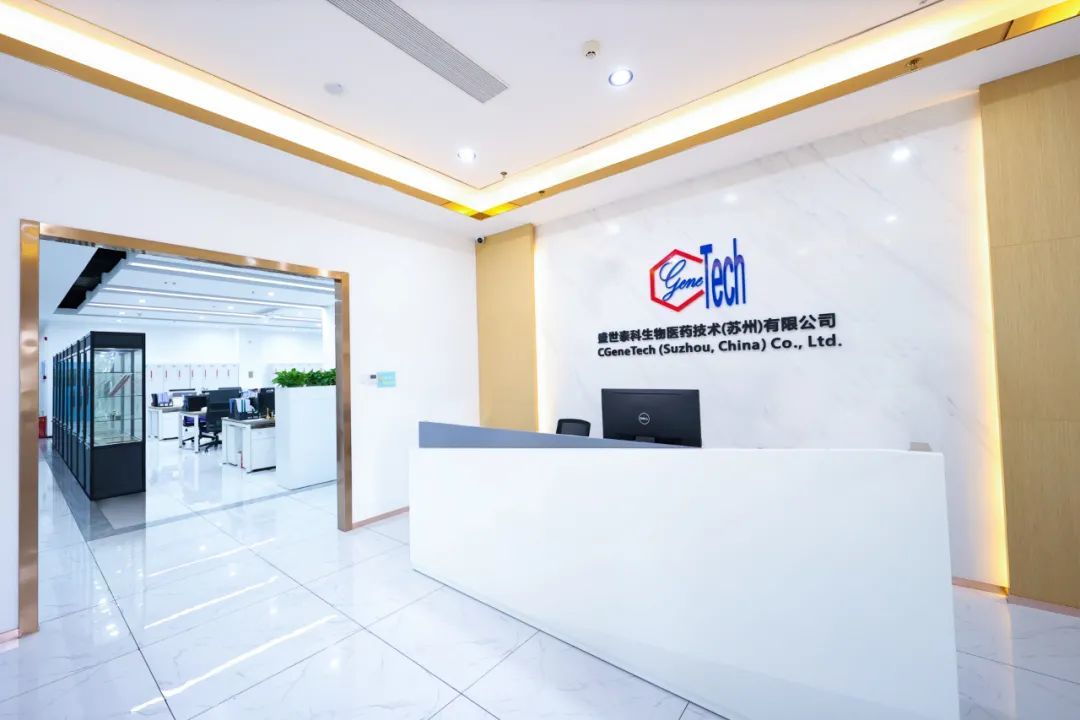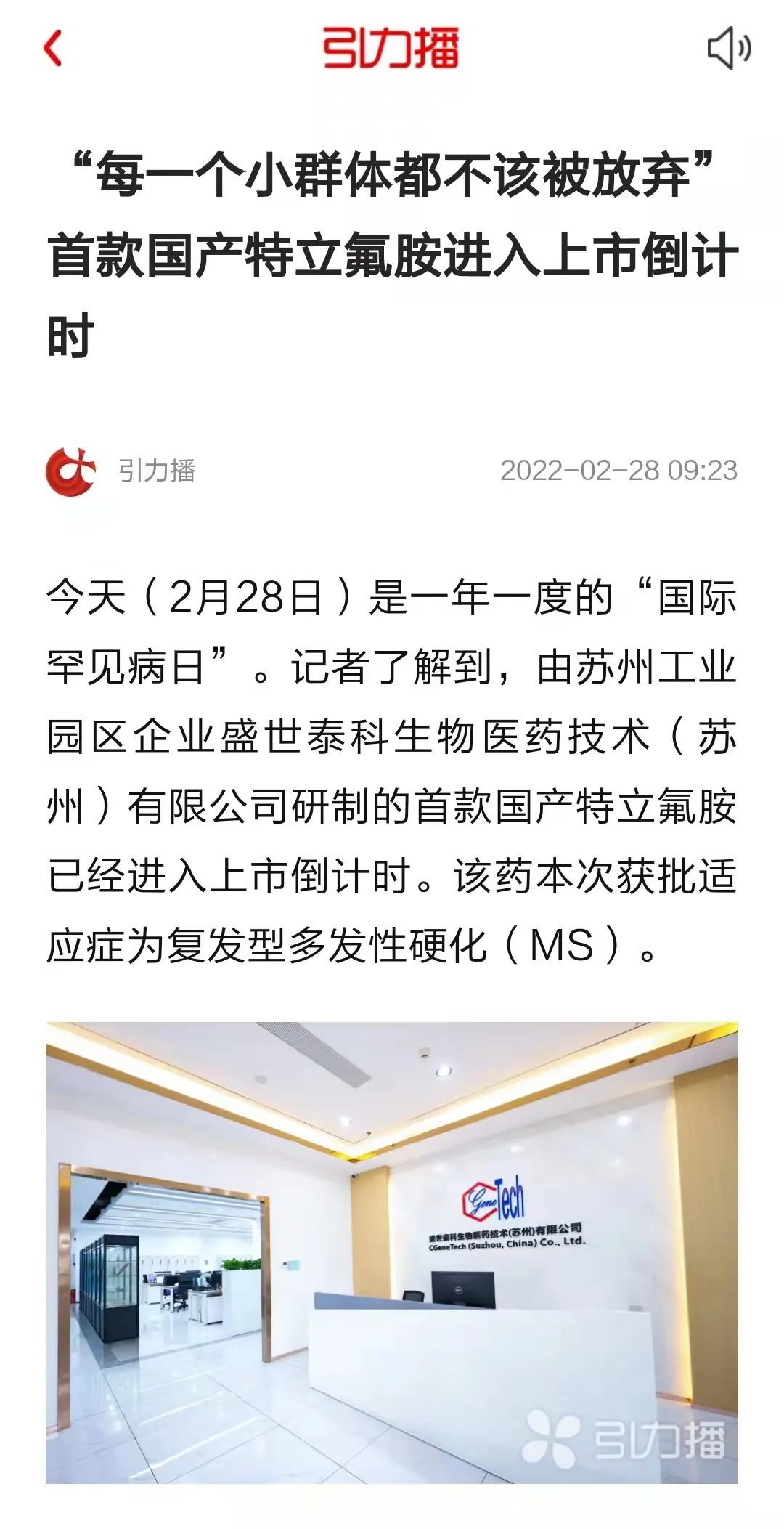No small group should be left behind.
Release date:
2022-02-28
Today marks the annual "International Rare Disease Day." Suzhou Daily learned that the first domestically produced teriflunomide, developed by Suzhou Industrial Park-based company Shengshi Taikang Biomedical Technology (Suzhou) Co., Ltd., is now on the verge of launching on the market. This time, the drug has been approved for relapsing forms of multiple sclerosis (MS). 
Multiple Sclerosis (MS) is a lifelong, chronic, and progressive disease affecting more than 2.3 million people worldwide, with an incidence rate of approximately 0.03%. In China, over 30,000 patients are currently living with the condition. In May 2018, MS was officially included in China’s "First Batch of Rare Disease Catalog," reflecting its autoimmune origin. The disease leads to damage and detachment of the myelin sheath surrounding nerve fibers, ultimately impairing the function of the spinal cord, brain, and optic nerves. As the condition progresses, patients often experience worsening neurological disabilities, eventually losing their ability to care for themselves, suffering vision loss, or even facing life-threatening complications. According to research from leading institutions, MS remains incurable, meaning patients must learn to live alongside the disease. Therefore, early intervention is critical to effectively manage disease activity and minimize the risk of irreversible neurological damage.
Founded in 2010 within the park, Shengshi Taikang operates under the belief that "no small community should be left behind." The company remains steadfastly committed to developing treatments for rare diseases and has established an integrated drug R&D platform that covers the entire lifecycle of innovative small-molecule drugs. Earlier this year, teriflunomide was approved by the National Medical Products Administration for its repurposed use in treating relapsing forms of multiple sclerosis. "In the consistency evaluation conducted against Sanofi's original drug, Shengshi Taikang's teriflunomide demonstrated comparable efficacy and safety profiles, meeting the same high standards as the reference product," said Yu Qiang, Founder and CEO of Shengshi Taikang.
Currently, Suzhou is accelerating its efforts to build an innovation cluster with international competitiveness and global influence. The city boasts an integrated drug R&D technology platform that covers the entire research and development pipeline, enabling continuous advancements in areas such as rare diseases, antidiabetic drugs, and anti-cancer therapies. Shengshi Taikang also has its own vision for contributing to the development of Suzhou's innovative cluster.
In addition to focusing on the development of drugs for rare diseases, Shengshitaike is also dedicated to researching and developing antidiabetic and anticancer medications. The company’s newly developed phosphate senvogliptin tablets are a novel DPP-4 inhibitor boasting high potency and exceptional safety profiles. Notably, these tablets were successfully included twice—in 2012 and 2018—on the national "12th Five-Year Plan" and "13th Five-Year Plan" major new drug innovation programs, respectively. In the second half of 2019, senvogliptin phosphate received official approval from the National Medical Products Administration’s Center for Drug Evaluation, allowing it to skip Phase II clinical trials and proceed directly into Phase III studies. Clinical trials are expected to wrap up by the second half of this year, potentially filling the gap in domestically produced DPP-4 inhibitors. Meanwhile, in the oncology space, the company has steered clear of popular antibody therapies like PD-1/L1, instead zeroing in on specific mutation types where current tumor immunotherapies often fall short in delivering effective results.
For a long time, factors such as new drug targets, delivery routes, dosage forms, potency, and therapeutic efficacy have often determined whether domestically developed innovative drugs ultimately succeed or fail. The reason why Shengshi Taikang’s phosphate senvogliptin tablets managed to advance "from Phase 2 directly to Phase 3" in clinical trials lies in the company’s breakthroughs in molecular design and formulation technology.
"Within the human body, there are various proteins—known as enzymes—that regulate essential physiological processes. Often, when people fall ill, it’s because these enzymes have either lost their activity or become overly active. Small-molecule drugs enter the body and work by modulating the function of these key enzymes, thereby achieving therapeutic effects," said Yu Qiang. He added that the efficacy and safety of small-molecule drugs are closely tied to their molecular design. Simply put, the molecular structure designed for a small-molecule drug essentially represents the drug’s earliest form—the appearance of its lead compound. The compound’s size and shape directly influence how potent it is, while its ability—or lack thereof—to "interact harmfully"—determines whether it poses any toxicity risks. Only after successfully clearing all these critical "development hurdles" can the drug officially "register," meaning it secures patent protection, paving the way for it to mature fully into a viable, market-ready medication."
It is reported that Shengshi Taikang's core technology team consists of four members, all of whom come from Peking University's Department of Chemistry, an institution renowned for its expertise in molecular design. "We hope that high-quality small-molecule drugs can be combined across boundaries with large-molecule antibody therapies, offering patients more treatment options." Yu Qiang said. 
Prev:
